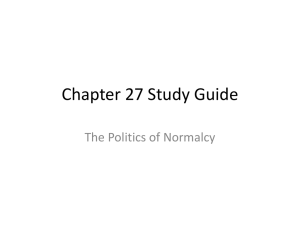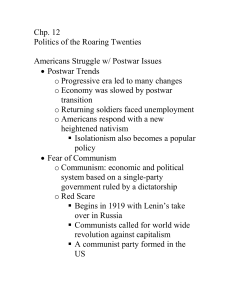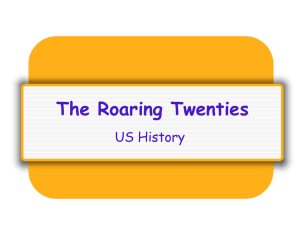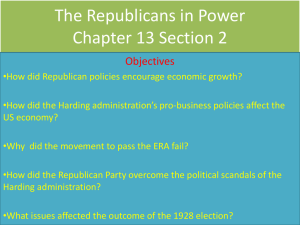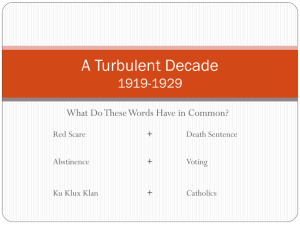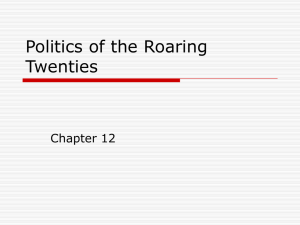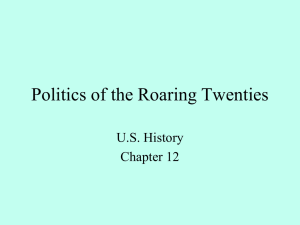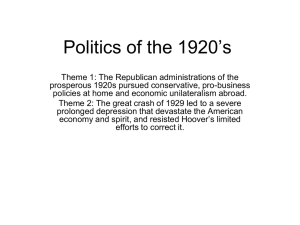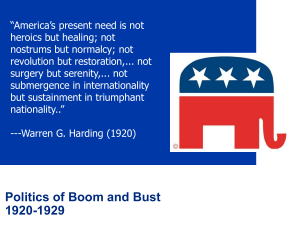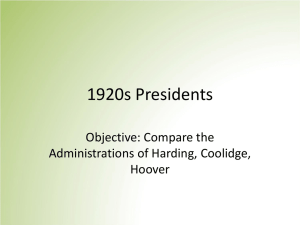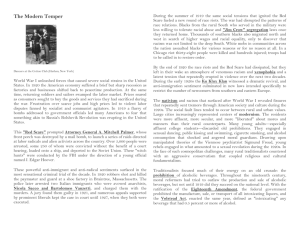1920s (1919-1929) - Introducing Adam Morton
advertisement
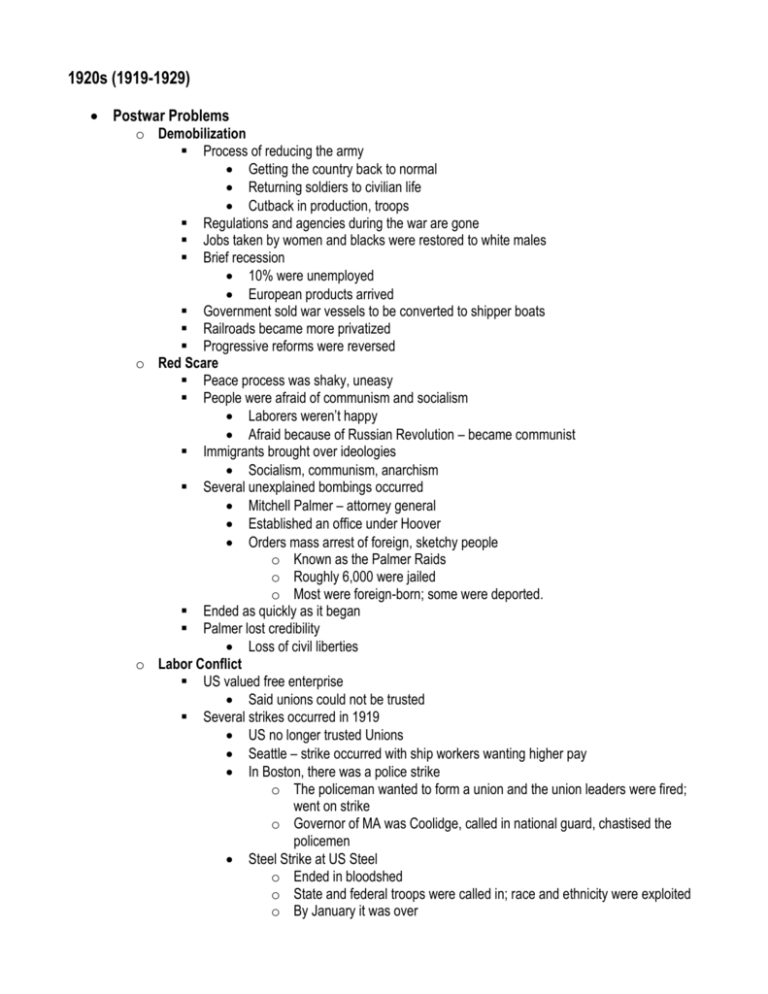
1920s (1919-1929) Postwar Problems o Demobilization Process of reducing the army Getting the country back to normal Returning soldiers to civilian life Cutback in production, troops Regulations and agencies during the war are gone Jobs taken by women and blacks were restored to white males Brief recession 10% were unemployed European products arrived Government sold war vessels to be converted to shipper boats Railroads became more privatized Progressive reforms were reversed o Red Scare Peace process was shaky, uneasy People were afraid of communism and socialism Laborers weren’t happy Afraid because of Russian Revolution – became communist Immigrants brought over ideologies Socialism, communism, anarchism Several unexplained bombings occurred Mitchell Palmer – attorney general Established an office under Hoover Orders mass arrest of foreign, sketchy people o Known as the Palmer Raids o Roughly 6,000 were jailed o Most were foreign-born; some were deported. Ended as quickly as it began Palmer lost credibility Loss of civil liberties o Labor Conflict US valued free enterprise Said unions could not be trusted Several strikes occurred in 1919 US no longer trusted Unions Seattle – strike occurred with ship workers wanting higher pay In Boston, there was a police strike o The policeman wanted to form a union and the union leaders were fired; went on strike o Governor of MA was Coolidge, called in national guard, chastised the policemen Steel Strike at US Steel o Ended in bloodshed o State and federal troops were called in; race and ethnicity were exploited o By January it was over Railroad Strike o 1922, broken up by a court injunction o RR labor board announced a 12% pay cut and workers had to return with pay cut Membership slowed o But wages increased in general o Race Riots Race riots occurred When blacks migrated north, blacks and whites competed for jobs East St. Louis Chicago Worst, 40 were killed Lynchings increased Republican Control o Business Doctrine 20s known for Republican dominance 1920 election – Harding v. Cox Harding was unclear about many issues Harding was elected by a landslide – ‘Return to Normalcy’ o Harding Presidency Congress was solidly Republican Business boomed Farmers and unions struggled Roosevelt died in 1919 End of progressivism Believed that there should be limited government regulation Leaders of organizations were conservative Republican party believed it would benefit if it protected business Harding Small-town guy, editor Didn’t have great leadership abilities Made Charles Evans Hughes Secretary of State and Hoover at Secretary of Commerce o Treasury Secretary – Andrew Mellon o Filled SC spot with former president Taft o Pardoned Eugene Debs Harding signed most bills that conservative Congress gave him Reduced income taxes Increased tariff rates Est. Bureau of the Budget o Created and submitted budget at once He was a corruptible post-war president His secretary of the interior, Fall, and Dougherty were found to have been accepting bribes from oilmen to let them use land – Teapot Dome Dougherty was taking bribes not to prosecute Harding died in Alaska of an aneurism o Coolidge Presidency Accepted presidency after death of Harding Won popularity as a Massachusetts Governor Broke Boston police strike He was the first president to be on the radio Was overwhelmingly nominated for the Republican candidate in the next election Democrats nominated conservative John Lewis Liberals were not happy o Began progressive party – Bob Lafollett Coolidge won Believed in limited government Inaction – didn’t do a whole lot Cut spending down to a bare minimum Sometimes he vetoed the conservative congress o Farm subsidies bill o Bonus Pensions for WWI veterans o McNary-Haugen Bill Would have give farmers a subsidy boost Coolidge declined to run again o Hoover and 1928 Election Hoover had a reputation as a naval leader; had served 3 presidents Republican candidate in 1928 Opponent was Al Smith – Catholic Smith was opposed to prohibition efforts Appealed to immigrants and Protestants were openly prejudice against Smith Republicans bragged about Coolidge Prosperity Hoover was expected to continue this and promised an end to poverty Hoover won in a landslide Mixed Economic Development o Causes of business Prosperity 20s began with a brief recession, from 22 to 28, things were uphill Ended in October of 1929 when the stockmarket crashed Unemployment was less that 4% Standard of living improved More electricity, indoor plumbing By 1930, 2/3 of all homes had electricity Prosperity was not universal Urban and rural areas had incomes below poverty level Mecca was WWI and the 20s was their downfall Industrial output increased 50% Found better ways to produce Improved mass production o Henry Ford – perfected assembly line in automobile manufacturing o Much more efficient, price of a car was 1/3 of what it used to be Improvement in use of energy Coal and electricity Homes and railroads still used coal, but oil and electricity became more common o By 1930, about ¼ of US energy was oil Factories began to use electric motors and production of energy tripled Government policy All levels favored business Offered tax cuts o Did nothing to enforce Antitrust laws o Farm Problems Best years were WWI, downfall was in the 20s Farmers who had borrowed money in the war were deeply in debt Crop prices were dropping Due to improvements Gasoline tractors and special fertilizers made farmers overproduce Produced surplus and they had to borrow more and grow more in order to prosper o Labor Problems Union membership declined about 20% Companies insisted on an open shop o Don’t have to belong to a union to reap the benefits and work jobs New Culture Culture dominated by young people More people lived in the city Culture based on popular tastes, morals, and mass consumption o Jazz Age Youth rebelled against elders and danced to jazz music Performed by black musicians City-theme Phonographs and radios were widespread Decade for increased radio ownership Broke down traditional culture barriers o Consumerism/Auto Electricity allowed people to buy new appliances Light industry People buying stuff Affordable autos, appliances, refrigerators, washers Marketing and Advertisement Encouraged people to compete with their neighbors in ownership Bright packaging and credit/installment plans helped growth Planned Obselesense Developed products that later became obsolete Product numbers and styles became outdated by new versions Learned to attractively display and package materials Cellophane o Clear plastic wrapping – Twinkie Wrapping Chains started marketing their products at lower prices than local stores Automobile By 1929, there were 26 and a half million registered vehicles, 1913 – 1.2 million o Roughly 1 car per family Car replaced railroad as key promoter of wealth Affected everything in life o Suburbs grew o Traveling increased o Changed the ways people dated Entertainment Changed as Well New radio stations o By 1930, 800 radio stations NBC started out as an affiliation of broadcasting stations o CBS and ABC News, sports, soap operas, comedies, and quiz shows could all be heard Going to the movies became a national habit o Hollywood became big o Theaters were ornate and large o Actors became really big and people began to recognize their names Could demand to work for different studios and work for different roles Talkie o First talking movie came out in 1927 o Jazz movie – “The Jazz Singer” People began naming their kids after famous people Sports o Boxing became big o Gertrude Ederle – swam the English Channel o Jim Thorpe – touchdowns Charles Lindbergh Young pilot who flew nonstop from Long Island to Paris o Flew over in the Spirit of Saint Louis Welcomed as a hero Later became a Senator and his baby was kidnapped and killed o Women at Home and at Work 19th Amendment – suffrage No immediate impact – 1920 election Conformist views Gender roles – more defined Mothers, homemakers Appliances - made life easier, routine was same Workforce Urban women – jobs Feminized professions – back to pre-war style Significant Change Revo. Against sexual taboos Sigmund Freud o Stress sex. Repression SEX Premarital sex o Novels, autos, movies promiscuity Margaret Sanger o Contraceptives Fashion Flappers – leaving nest early Education Graduates married and abandoned jobs o Revolution in Morals Divisions among Protestants – young v. old, urban v. rural Modernists Connections btw science and religion General translation of Bible Fundamentalists Rural – literal translation of Bible Creation = 7 days – origin of life Modernists = moral decay Revivalists Used radio, Hollywood, drama – Billy Sunday o Attacked immoralities Aimee Semple Phearson o Twin Evils = Communism and Jazz Divorce Rises Divorce laws were more liberalized – 1/6 More Public Schools Economy More informed, more skills By end of 1920, HS grads doubled Literature of Alienations Writers Religion – hypocritical Gertrude Stein o ‘lost generation’ o Scott Fitzgerald, Sinclair Lewis, Ernest Hemingway Harlem Renaissance Industrial art – making functional items pretty Frank Lloyd Wright – architect – made buildings blend in Edward Hopper Painted ‘playhouses’ - audience Georgia O’Keefe – tulips and skulls 1930 – 1/5 blacks lived in north Harlem – top black community – 200,000 Renaissance – black music and art o Poets (Langston Hughes) o Singers, artists, musicians United Negro Improvement Association Preached black nationalism – Marcus Garvey Separatism – self-sufficient – ‘back to Africa’ movement o o o o Conflict of Cultures o Scopes Trial TN Trial – illegal to teach evo. in schools ACLU offered to pay defense of teacher who would teach evo. John Scopes – Paducah Taught, was arrested Court Nation followed case Defense – Clarence Darrow Prosecuting Attorney – WJB rep. TN Testified as Biblical expert o Darrow poked holes in fundamentalist views WJB died of stroke Stress = trial Scopes was convicted – later overturned minor fine technicality o Prohibition 18th Amendment - prohibited sale and manufacture of alcoholic beverages Volstead Act – laws that carried out the 18th Created agencies and agents People made their own Gangs Al Capone encouraged black market – underground liquor market Organized crime o Nativism/S and V Trial After WWI, nativism rose Workers feared competition Isolationists said we needed to seclude ourselves Immigration Act 1920 Census – took numbers of different ethnicities Said that 3% of those populations could still come 1924 Immigration Act Used 1890 census – more northern European immigrants Allowed less southern and eastern Europeans o Only 2% of those people could come 1927 Quota limited immigrants from Asia, E/S Europeans to 150,000 from each country No Japanese could come Italian Immigrants – Sacco and Vanzetti Italian anarchists – active against US govt. Payroll robbery – 1921 o Clerk was shot and robbed Italians were blamed – no viable evidence o Tried and found guilty – sentenced to electric chair – executed o KKK Reemerges Targeted blacks, Jews, Catholics – expanding the hatred 5 million – 1925 – Midwest America was changing and they didn’t like it Clan became corrupt and leader was accused of murder Isolationist Foreign Policy o Disarmament Charles Hughes – Washington Conference – 1921 Belgium, China, France, Italy, Japan, Dutch, Portugal Treaties Five-Power o Countries with 5 largest navies = scrapped destroyers and ships safety/equality Four-Power o US, France, GB, Japan – respect property in Pacific Nine-Power o all countries stop exploitation of China Kellogg Briand Treaty 62 nations signed it, denounced offensive war o Didn’t mention defensive wars (Japanese were defending themselves when they bombed Pearl Harbor) o Didn’t know how to punish violators o Business Diplomacy Presidents used diplomacy to advance business interests Mexico o Nationalized oil reserves/minerals in Constitution o US negotiated to maintain oil rights US was still in Nicaragua and Haiti o US resented not so much positive influence o Investments in LA countries doubled Middle East o Oil reserves – major source of wealth o Secretary of State Hughes won drilling rights for US Forney-McCumber Raised tariffs 25% Caused problems – limited cash flow btw countries o War Debts and Reparation Before WWI, US was a debtor country After, US was a creditor – loaned billions to allies in WWI Harding, Coolidge – tried to force French and GB to repay money Caused hard feelings Policies w/ tariffs made it harder to repay Reparation Germany had to pay allies 30 billion dollars Printed more money and caused inflation in order to pay o Lost its value Charles Dawes – banker o Dawes Plan Create a cycle of payments US banks would offer loans Help Germany build up economy and pay war debts Finland was the only country that repaid all war debts
